虚拟语气的几个常见句型
虚拟语气的八种情况

No.1虚拟语气的常见类型和句型(1)由wish引起的表示愿望的虚拟语气A.用wish表示对现在的愿望时,它所引起的宾语从句中谓语动词形式为:过去式(be动词用were)。
B.用wish表示对将来的愿望时,它所引起的宾语从句中谓语动词形式为:would, could, might+ 动词原形。
C.wish用于对过去的事实表示一种不可能实现的愿望时,宾语从句中的谓语动词形式为:had+动词过去分词或could, would + have +动词过去分词。
The picture exhibition bored me to death; I wish I had not gone to it.---“I let Joe borrow our radio for the afternoon.”---“That’s all right, but I wish he would buy one of his own.”I wish that he weren’t so lazy.(2)had hoped引起的宾语从句中备用语动词形式为would+动词原形,表示一种过去未实现的愿望或令人失望的事。
His father had hoped that his son would go to business with him, but his son became an artist later.(3)would (had) rather, would as soon, would sooner和would prefer所引起的从句中要求用过去式表示当时或将来的情况,用过去完成时表示过去的情况,表示希望或婉转的责备。
例如:I’d rather you posted the letter right away. 我倒希望你把这封信立刻寄出去。
I would prefer he didn’t stay there too long.我倒希望他不要在那儿可得太久。
常见的虚拟语气句型
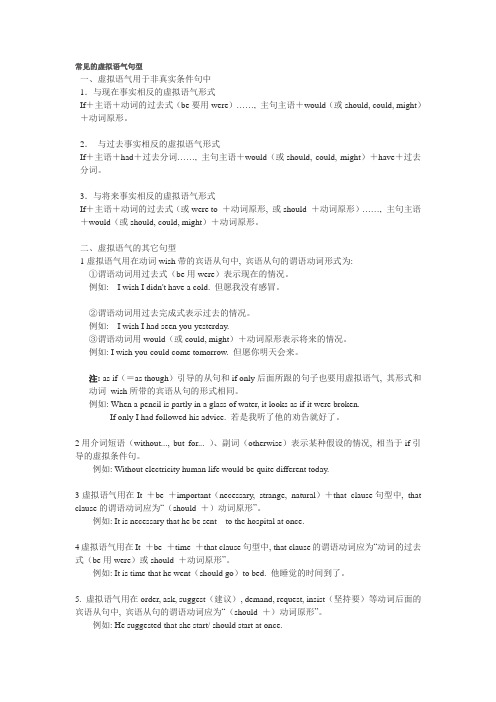
常见的虚拟语气句型一、虚拟语气用于非真实条件句中1.与现在事实相反的虚拟语气形式If+主语+动词的过去式(be要用were)……, 主句主语+would(或should, could, might)+动词原形。
2.与过去事实相反的虚拟语气形式If+主语+had+过去分词……, 主句主语+would(或should, could, might)+have+过去分词。
3.与将来事实相反的虚拟语气形式If+主语+动词的过去式(或were to +动词原形, 或should +动词原形)……, 主句主语+would(或should, could, might)+动词原形。
二、虚拟语气的其它句型1虚拟语气用在动词wish带的宾语从句中, 宾语从句的谓语动词形式为:①谓语动词用过去式(be用were)表示现在的情况。
例如: I wish I didn't have a cold. 但愿我没有感冒。
②谓语动词用过去完成式表示过去的情况。
例如: I wish I had seen you yesterday.③谓语动词用would(或could, might)+动词原形表示将来的情况。
例如: I wish you could come tomorrow. 但愿你明天会来。
注: as if(=as though)引导的从句和if only后面所跟的句子也要用虚拟语气, 其形式和动词wish所带的宾语从句的形式相同。
例如: When a pencil is partly in a glass of water, it looks as if it were broken.If only I had followed his advice. 若是我听了他的劝告就好了。
2用介词短语(without..., but for... )、副词(otherwise)表示某种假设的情况, 相当于if引导的虚拟条件句。
例如: Without electricity human life would be quite different today.3虚拟语气用在It +be +important(necessary, strange, natural)+that clause句型中, that clause的谓语动词应为“(should +)动词原形”。
虚拟语气十大句型
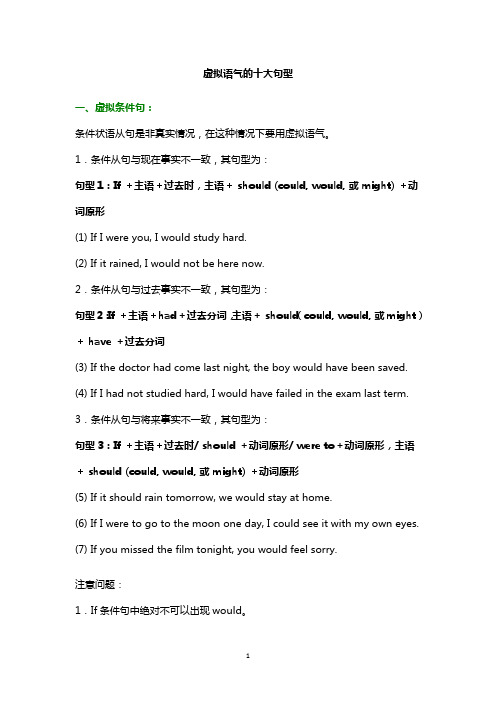
虚拟语气的十大句型一、虚拟条件句:条件状语从句是非真实情况,在这种情况下要用虚拟语气。
1.条件从句与现在事实不一致,其句型为:句型1:If +主语+过去时,主语+ should (could, would, 或might) +动词原形(1) If I were you, I would study hard.(2) If it rained, I would not be here now.2.条件从句与过去事实不一致,其句型为:句型2:If +主语+had+过去分词,主语+ should(could, would, 或might)+ have +过去分词(3) If the doctor had come last night, the boy would have been saved.(4) If I had not studied hard, I would have failed in the exam last term. 3.条件从句与将来事实不一致,其句型为:句型3:If +主语+过去时/ should +动词原形/ were to+动词原形,主语+ should (could, would, 或might) +动词原形(5) If it should rain tomorrow, we would stay at home.(6) If I were to go to the moon one day, I could see it with my own eyes.(7) If you missed the film tonight, you would feel sorry.注意问题:1.If条件句中绝对不可以出现would。
2.根据句中的时间状语,有时可能出现“混合虚拟”的情况,即主句可能是现在的情况,条件句也许是发生在过去的情况,但都要遵守上述句型。
如:(8) If you had studied hard before, you would be a college student now and you would graduate from a college in four years’ time.3.条件句中如果出现were, had, should可省去if,将主语与这些词倒装。
虚拟语气4大类型
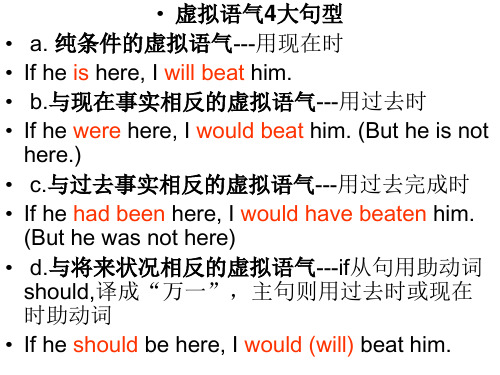
•
• 虚拟语气 大句型 虚拟语气4大句型 a. 纯条件的虚拟语气 纯条件的虚拟语气---用现在时 If he is here, I will beat him. b.与现在事实相反的虚拟语气 与现在事实相反的虚拟语气---用过去时 与现在事实相反的虚拟语气 If he were here, I would beat him. (But he is not here.) c.与过去事实相反的虚拟语气 与过去事实相反的虚拟语气---用过去完成时 与过去事实相反的虚拟语气 If he had been here, I would have beaten him. (But he was not here) d.与将来状况相反的虚拟语气 与将来状况相反的虚拟语气---if从句用助动词 与将来状况相反的虚拟语气 should,译成“万一”,主句则用过去时或现在 时助动词 If he should be here, I would (will) beat him.
பைடு நூலகம்
• 使用时机及要点: • 1.表与过去事实相反,换言之,当时事实并非如 此。 • 2. 注意if从句中的had与had had的区别。试比较 以下这两句话: • If he had money, he would buy a car. • If he had had money, he would have bought a car. • If he had money, he would have bought a car.
• If 的省略 • 虚拟语气的if 从句中,若有过去完成时助动词had、或 表示 “万一”的助动词should或是were出现时,可将 这些词置于主语前,而省略掉if. • a. had • 如果当时他做了这件事,他会后悔的。 • If he had done it, he would have felt sorry. • =Had he done it, he would have felt sorry. b. should 万一他说谎,我会处罚他。 If he should tell lies, I would punish him. =Should he tell lies, I would punish him. c. were 如果他懒惰,就可能会失败。 If he were lazy, he might fail. =were he lazy, he might fail.
虚拟语气15种句型
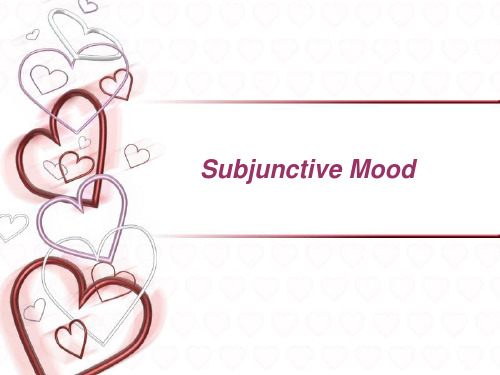
3.as if / as though后的表语或状语从句 (与wish相同)
含义 动 词 形 式
例句
现在 did / were
He looks as if he knew the little girl.
过去 Have done
It appeared as if nothing had
happened.
5.动词形式为(should)+do 的虚拟
2. It’s + adj.+that 的主语从句 (adj: necessary / essential/
important / natural / strange / possible / impossible
eg. It is important that we should attend the meeting.
• 对过去的猜测 • 肯定 must have done • 否定 can / could not have done • 可能 may / might have done
• 本应该做(实际没有做,有责备意思) • should have done • shouldn’t have done • 本来有必要作(实际没有做,不含责
desire 命令:order / command/ 坚持:insist 不管是动词还是名词,不管是主动还是被动
,不管是引导主语从句, 宾语从句, 表语 从句还是同位语从句, 都要用(should) do
5.动词形式为(should)+do 的虚拟
• My suggestion is that we should listen to his opinion first.
It is time that we stopped work and went home.
高中英语虚拟语气的十大句型

高中英语虚拟语气的十大句型虚拟条件句:条件状语从句是非真实情况,在这种情况下要用虚拟语气。
1.条件从句与现在事实不一致,其句型为:句型1:If +主语+过去时,主语+should (could, would, 或might) +动词原形(1) If I were you, I would study hard.(2) If it rained, I would not be here now.2.条件从句与过去事实不一致,其句型为:句型2:If +主语+had+过去分词,主语+should(could, would, 或might)+have +过去分词(3) If the doctor had come last night, the boy would have been saved.(4) If I had not studied hard, I would have failed in the exam last term.3.条件从句与将来事实不一致,其句型为:句型3:If +主语+过去时/ should +动词原形/ were to+动词原形,主语+should (could, would, 或might) +动词原形(5) If it should rain tomorrow, we would stay at home.(6) If I were to go to the moon one day, I could see it with my own eyes.(7) If you missed the film tonight, you would feel sorry.注意问题:1.If条件句中绝对不可以出现would。
2.根据句中的时间状语,有时可能出现“混合虚拟”的情况,即主句可能是现在的情况,条件句也许是发生在过去的情况,但都要遵守上述句型。
如:(8) If you had studied hard before, you would be a college student now and you would graduate from a college in four years’time. 3.条件句中如果出现were, had, should可省去if,将主语与这些词倒装。
虚拟语气分三种情况来掌握

虚拟语气分三种情况来掌握:1、虚拟条件句。
2、名词性虚拟语气。
3、虚拟语气的其他用语。
一、虚拟条件句:条件状语从句是非真实情况,在这种情况下要用虚拟语气。
1、条件从句与现在事实不一致,其句型为:If 主语+过去时,主语+should(could, would, 或might)+动词原形,如:If I were you, I would study hard.If it rained, I would not be here now.2、条件从句与过去事实不一致,句型为:If 主语+had+过去分词,主语+should(could, would, 或might)+have+过去分词,如:If the doctor had come last night, the boy would have saved.If I had not studied hard, I would have failed in the exam last term.3、条件从句与将来事实不一致,句型为:+do,主语+should(could…)+原形do过去时(与现在事实条件句一样)。
If it should rain tomorrow, we would stay at home.If I were to go to the moon one day, I could see it with my own eyes.If you missed the film to night, you would feel sorry.注意问题:1、If条件句中绝对不可出现“would”。
2、根据句中的时间状语,有时可能出现“混合虚拟”的情况,即主句可能是现在的情况,条件句也许是发生在过去的情况,但都是遵守上述句型。
3、在条件句中如果出现were, had, should可省去if,将主语与这些词倒装,例如:Had the doctor come last night, the boy would have saved.Were I to go to the moon one day, I would see it with my own eyes.Should it rain tomorrow, we would stay at home.二、名词性虚拟语气:在表示命令、建议要求、惊叹时的名词性从句中需用虚拟语气,基本句型:主语+(should)+动词原形,如:Mother insisted that John go to bed at 9 o’clock.(宾语从句)We suggested that the meeting should not be held.It was required that the crops should be harvested at once.(主语从句)The suggestion that he be invited was rejected.(同位语从句)That is their demand that their wages be increased.(表语从句)注意:在这种句子中绝不出现“would”“must”“could”等。
关于英语虚拟语气的用法总结
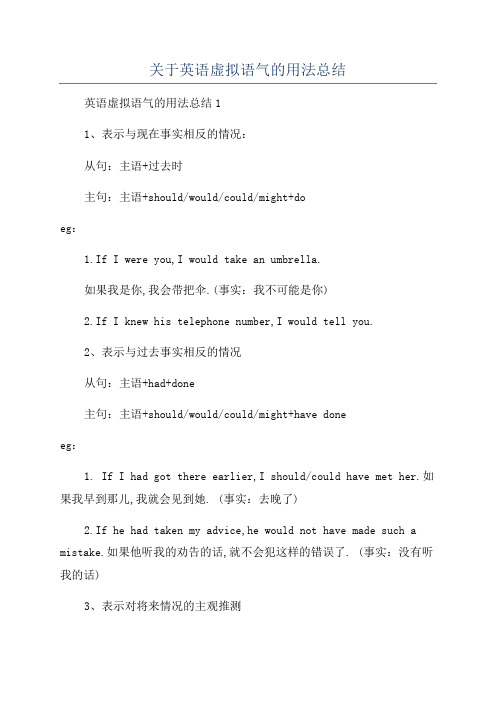
关于英语虚拟语气的用法总结英语虚拟语气的用法总结11、表示与现在事实相反的情况:从句:主语+过去时主句:主语+should/would/could/might+doeg:1.If I were you,I would take an umbrella.如果我是你,我会带把伞.(事实:我不可能是你)2.If I knew his telephone number,I would tell you.2、表示与过去事实相反的情况从句:主语+had+done主句:主语+should/would/could/might+have doneeg:1. If I had got there earlier,I should/could have met her.如果我早到那儿,我就会见到她. (事实:去晚了)2.If he had taken my advice,he would not have made such a mistake.如果他听我的劝告的话,就不会犯这样的错误了. (事实:没有听我的话)3、表示对将来情况的主观推测从句:主句①if+主语+were to do :①主语+should/would/could/might+do②if+主语+did/were ②主语+should/would/could/might+do③if+主语+should+do ③主语+should/would/could/might+doeg:如果他明天来这儿的话,我就跟他谈谈.(事实:来的可能性很小)2.If there were a heavy snow next Sunday,we would not go skating.如果下周日下大雪,我们就不能去滑冰了.(事实:不知能否下雪)3.If she were to be here next Monday,I would tell her about the matter.如果她下周一来这儿的话,我就会告诉她这件事的始末.英语虚拟语气的用法总结2第一部分:语气的定义和种类1 语气(mood)语气是动词的一种形式,表示说话人对其中一行为或事情的看法和态度。
虚拟语气15种句型总结
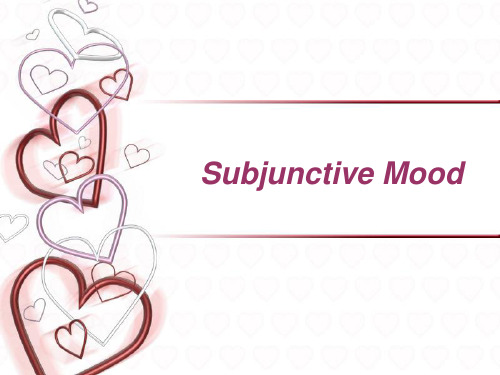
C.didn’t hurt; would go
D.didn’t hurt; would have gone
17 21 19
2.wish 后的宾语从句 = if only
含义
动词形式
对现状 表达愿望 Did / were
对过去表示 遗憾/后悔
Had done
例句
I wish I had a little lab of my own.
备意思)
• Need have done • Needn't have done
Practice
1. If I _k_n_e_w__ (know) her address, I would write to her. 2. What would you have done if you _h_a_d__m__is_s_e_d(miss) the train? 3. If he h__a_d_n_o_t_b__ee_n_ il(lnot be ill ), he would have done something. snows 4. If itw__er_e__to__/s_h_o_u_l_d__sn_o_w__/_s_n_o_w_e_d(snow) tomorrow, we _sh__o_u_ld__g_e_t_u_p_(get up) early.
• My suggestion that we should listen to his opinion first is being discussed.
• 注意当insist—硬说,suggest—表明, 不能有虚拟语气。
5.动词形式为(should)+do 的虚拟
2. It’s + adj.+that 的主语从句 (adj: necessary / essential/
虚拟语气的用法与句型

虚拟语气的用法与句型虚拟语气是指在句子中表达一种假设、愿望、建议、命令等非真实情况的语气。
它在表达的内容上与现实相悖,用于描述与实际情况相反或与现在事实相反的假想情况。
虚拟语气在汉语中分为虚拟条件和虚拟假设两种情况。
本文将详细介绍虚拟语气的用法和常见句型。
一、表示假设的虚拟条件句型1. 如果引导的条件句条件句使用“如果+主语+动词”的结构,表示与实际情况相反的假设。
举例:如果我会飞,我就飞到天空中。
如果你能去,我们就一起去旅行。
如果明天下雨,我就不去跑步了。
2. 要是引导的条件句条件句使用“要是+主语+动词”的结构,表示与实际情况相反的假设。
举例:要是你在这里,我就不会感到孤单。
要是他努力学习,他就可以考上大学。
要是明天放假,我就会去看电影。
3. 假如引导的条件句条件句使用“假如+主语+动词”的结构,表示与实际情况相反的假设。
举例:假如我是你,我就不会这样选择。
假如我有足够的时间,我就会旅行。
假如天气好,我们就可以去海边玩。
二、表示愿望的虚拟条件句型1. 祈使句+“但愿(希望)”句型使用祈使句来表达对未来情况的愿望,后接“但愿(希望)”引导的句子,表示非真实情况的愿望。
举例:多带雨伞,但愿今天不下雨。
早点回家,但愿家里没人。
努力学习,但愿能考好成绩。
2. 希望/愿望+“(能)+动词原形”使用希望或愿望来表达对未来情况的期望,后接能否+动词原形,表示非真实情况的愿望。
举例:我希望明天不下雨。
我希望他能来参加我的生日派对。
我希望你明天能早点到公司。
三、表达建议的虚拟条件句型1. 建议/要求/命令+“(应该)+动词原形”使用建议、要求或命令来表达对他人的建议,后接“应该”引导的句子,表示非真实情况的建议。
举例:你应该多锻炼身体,这样会更健康。
你应该早点睡觉,这样明天才能精神饱满。
上班迟到是不对的,你应该注意时间。
2. 要是/如果+动词过去式使用要是或如果来引导一个非真实情况的条件句,表示一种建议或建议的情感色彩。
虚拟语气
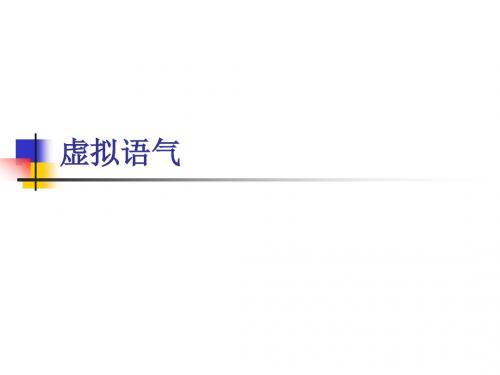
It is
that
(should) do
Examples:
It is suggested that we (should) protect our environment. 我们该保护环境了。 It is necessary that we protect our environment. 我们必须保护环境了。 It is a pity that you (should) miss it again. 真可 惜你又错过了。 It is insisted that he do his homework by himself.
历届真题详解
5. I think it’s high time we _______ strict measures to stop pollution. (02.12.A) A) will take B) take
C) took
D) have taken
6. He talked as if he (do) ________ all the work himself, but in fact Tom and I did most of it. (2001.1.B级)
虚拟语气
一、概述
虚拟语气(Subjunctive Mood)这一语 法项目几乎是二级必考的内容
虚拟语气是一种特殊的动词形式,用来 表示说话人所说的话并不是事实,而是 一种假设、愿望、怀疑、建议或推测。 常见的虚拟语气类型:
1.If引导的非真实条件句
A.与现在事实相反的假设
主句 would (should)等 +动词原形
2. wish引导的宾语从句
初中英语语法知识总结之虚拟语气

初中英语语法知识总结之虚拟语气虚拟语气是英语中的一种特殊语气,用于表示与事实相反的假设、愿望、建议、命令等。
在初中英语中,虚拟语气是一个重要的语法知识点,掌握好虚拟语气的用法可以帮助我们更准确地表达自己的意思。
下面是对初中英语虚拟语气的相关知识总结。
一、虚拟语气的用法1.与现在事实相反的虚拟语气(与现在事实相反的假设)表示对现在情况的否定、假设或建议。
a) 与现在动作情况相反:If I were you, I would study harder.(如果我是你,我会更加努力学习。
)注意:“were”在这里被用作“was”的虚拟形式,表示与现在事实相反的假设。
b) 与现在实际情况相反:I wish I had more time.(我希望我有更多时间。
)注意:“I wish”后跟的是“had”,表示现在我没有更多时间的愿望。
2.与过去事实相反的虚拟语气(与过去事实相反的假设)表示对过去情况的否定、假设或建议。
a) 与过去动作情况相反:If I had studied harder, I would have passed the exam.(如果我当初学得更努力,我就能通过这次考试了。
)b) 与过去实际情况相反:I wish I had listened to my parents.(我希望我当初听了我的父母的话。
)3.与将来事实相反的虚拟语气(与将来事实相反的假设)表示对将来情况的否定、假设或建议。
a) 表示对将来情况的不可能性:If it were to rain tomorrow, we would cancel the picnic. (如果明天下雨,我们就会取消野餐计划。
)b) 表示对将来情况的愿望:I hope I will pass the exam. (我希望我能通过考试。
)二、虚拟语气的常见句型1. If only + 过去式表示很遗憾没有实现过去的愿望。
例如:If only I had listened to my teacher's advice, I would not have made such a mistake.(要是我当初听从了老师的建议,就不会犯这样的错误了。
虚拟语气
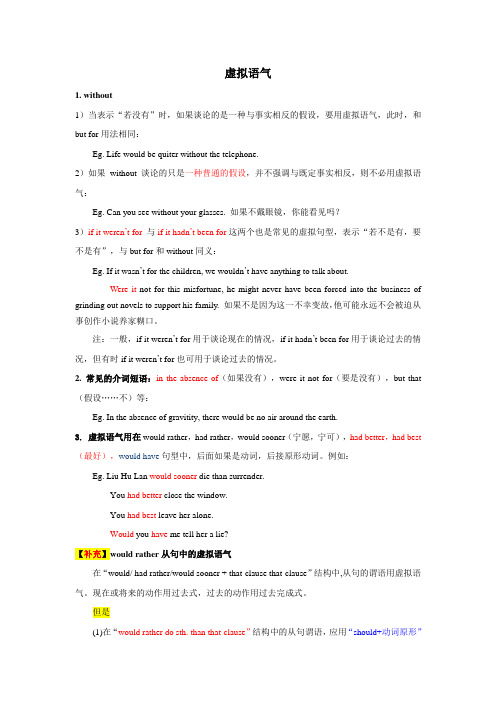
虚拟语气1. without1)当表示“若没有”时,如果谈论的是一种与事实相反的假设,要用虚拟语气,此时,和but for用法相同:Eg. Life would be quiter without the telephone.2)如果without谈论的只是一种普通的假设,并不强调与既定事实相反,则不必用虚拟语气:Eg. Can you see without your glasses. 如果不戴眼镜,你能看见吗?3)if it weren’t for与if it hadn’t been for这两个也是常见的虚拟句型,表示“若不是有,要不是有”,与but for和without同义:Eg. If it wasn’t for the children, we wouldn’t have anything to talk about.Were it not for this misfortune, he might never have been forced into the business of grinding out novels to support his family. 如果不是因为这一不幸变故,他可能永远不会被迫从事创作小说养家糊口。
注:一般,if it weren’t for用于谈论现在的情况,if it hadn’t been for用于谈论过去的情况,但有时if it weren’t for也可用于谈论过去的情况。
2. 常见的介词短语:in the absence of(如果没有),were it not for(要是没有),but that (假设……不)等:Eg. In the absence of gravitity, there would be no air around the earth.3. 虚拟语气用在would rather,had rather,would sooner(宁愿,宁可),had better,had best (最好),would have句型中,后面如果是动词,后接原形动词。
虚拟语气讲义(15个句式)

虚拟语气讲义1.虚拟语气句型1If + were/ did/ (动词的过去式), 主语+would/ might/ should / could + do 。
(表示对现在的假设)eg. If I were you, I would not be so proud . 如果我是你,我不会如此自负.eg. I don’t have a cellphone. If I had one , it would be convenient for me to get in touch with others 我没有手机,如果我有手机的话,和别人联系就方便的多了。
eg. If I were in your position, I would think better of it .如果我处在你现在的境地,我会重新考虑然后放弃。
2. 虚拟语气句型2If + had done, 主语+would/ might/ should / could + have done表示对过去或已经发生事情的虚拟假设。
eg. What a pity it is that you didn’t attended the concert yesterday! If you had attended the concert, you would have seen the famous singer.真遗憾你昨天没有去听音乐会。
如果你去了,你就会见到那位名歌手。
eg. Anyone in his position would have done the same= If anyone had been in his position, he would have done the same.3. 虚拟语气句型3If + were/ did(动词过去式)/should/ were to do , 主语+would/ might/ should / could + do (表示对将来的假设).eg. If he should refuse (= if he were to refuse = if he refused ), it wouldn’t matter万一他拒绝了. 那也没有什么关系.eg. If you shouldn’t pass the college entrance e*amination, what would you do"万一你高考不中,你该怎么办?4. 虚拟语气条件句的倒装在虚拟条件句中,如果出现有were, had, should,可省去if,可将主语与这些词倒装,构成虚拟倒装句。
虚拟语气总结(简单实用)

虚拟语气总结虚拟语气是一种动词形式,表示说话人的一种愿望,假设,怀疑,猜测,建议等含义,虚拟语气所表示的含义不是客观存在的事实。
一、主语+advise that… (would/ should) +动词原形…此类宾语从句中,其中的连接词that 以及情态动词would 或者should常可以省略。
类似的动词还有:ask 要求advise 劝告determine 决定decide 决定command 命令insist 坚持intend 打算propose 提议order 命令recommend 推荐request 要求r equire 要求suggest 建议demand要求desire 渴望比如:1. He insisted that all of us should be there on time by any means.2. He teacher suggested that we (should) clean the blackboard after class.二、It is important (necessary, strange, natural) that .... 此类的形式主语的真正主语,即主语从句的句型中。
类似的形容词还有:appropriate 适当的advisable 适当的,合理的better 较好的desirable 理想的essential 精华的preferable 优越的,较好的urgent 紧迫的vital 极其重要的下面几个过去分词也适用这个句型:desired, demanded, ordered, requested, suggested, recommended, required比如:1.It’s necessary that we should have a walk now. 我们有必要出去散散步。
2. It’s natural that she should do so. 她这样做是很自然的。
最基本的虚拟语气句型
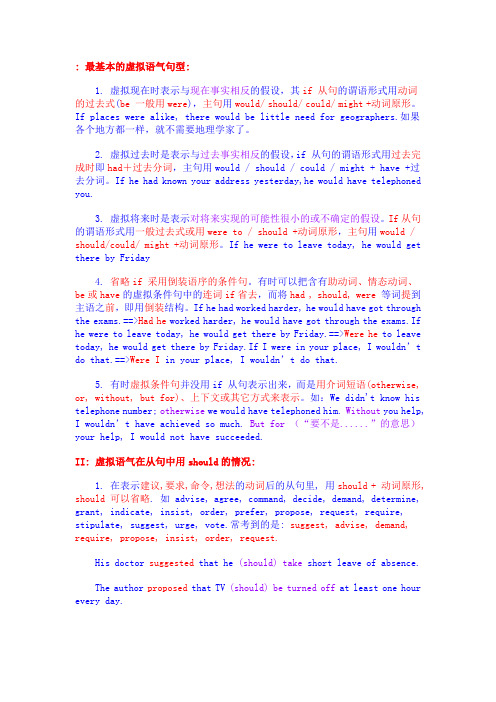
: 最基本的虚拟语气句型:1. 虚拟现在时表示与现在事实相反的假设,其if 从句的谓语形式用动词的过去式(be 一般用were),主句用would/ should/ could/ might +动词原形。
If places were alike, there would be little need for geographers.如果各个地方都一样,就不需要地理学家了。
2. 虚拟过去时是表示与过去事实相反的假设,if 从句的谓语形式用过去完成时即had+过去分词,主句用would / should / could / might + have +过去分词。
If he had known your address yesterday,he would have telephoned you.3. 虚拟将来时是表示对将来实现的可能性很小的或不确定的假设。
If从句的谓语形式用一般过去式或用were to / should +动词原形,主句用would / should/could/ might +动词原形。
If he were to leave today, he would get there by Friday4.省略if 采用倒装语序的条件句。
有时可以把含有助动词、情态动词、be或have的虚拟条件句中的连词if省去,而将had , should, were等词提到主语之前,即用倒装结构。
If he had worked harder, he would have got through the exams.==>Had he worked harder, he would have got through the exams.If he were to leave today, he would get there by Friday.==>Were he to leave today, he would get there by Friday.If I were in your place, I wouldn’t do that.==>Were I in your place, I wouldn’t do that.5. 有时虚拟条件句并没用if 从句表示出来,而是用介词短语(otherwise, or, without, but for)、上下文或其它方式来表示。
什么是虚拟语气
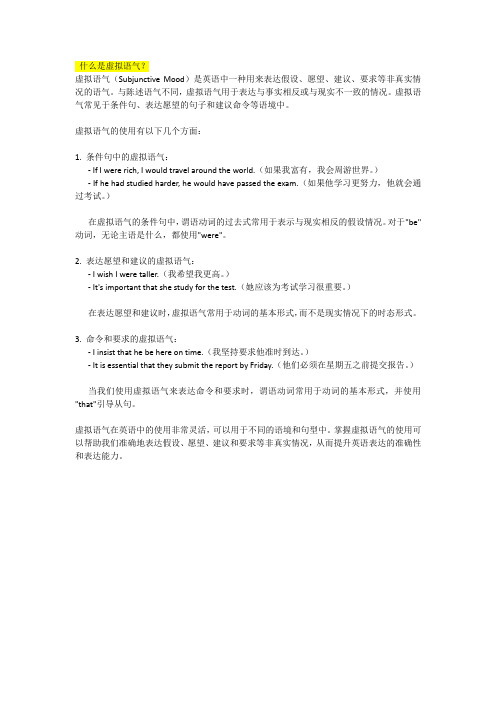
什么是虚拟语气?虚拟语气(Subjunctive Mood)是英语中一种用来表达假设、愿望、建议、要求等非真实情况的语气。
与陈述语气不同,虚拟语气用于表达与事实相反或与现实不一致的情况。
虚拟语气常见于条件句、表达愿望的句子和建议命令等语境中。
虚拟语气的使用有以下几个方面:1. 条件句中的虚拟语气:- If I were rich, I would travel around the world.(如果我富有,我会周游世界。
)- If he had studied harder, he would have passed the exam.(如果他学习更努力,他就会通过考试。
)在虚拟语气的条件句中,谓语动词的过去式常用于表示与现实相反的假设情况。
对于"be"动词,无论主语是什么,都使用"were"。
2. 表达愿望和建议的虚拟语气:- I wish I were taller.(我希望我更高。
)- It's important that she study for the test.(她应该为考试学习很重要。
)在表达愿望和建议时,虚拟语气常用于动词的基本形式,而不是现实情况下的时态形式。
3. 命令和要求的虚拟语气:- I insist that he be here on time.(我坚持要求他准时到达。
)- It is essential that they submit the report by Friday.(他们必须在星期五之前提交报告。
)当我们使用虚拟语气来表达命令和要求时,谓语动词常用于动词的基本形式,并使用"that"引导从句。
虚拟语气在英语中的使用非常灵活,可以用于不同的语境和句型中。
掌握虚拟语气的使用可以帮助我们准确地表达假设、愿望、建议和要求等非真实情况,从而提升英语表达的准确性和表达能力。
虚拟语气常用句型
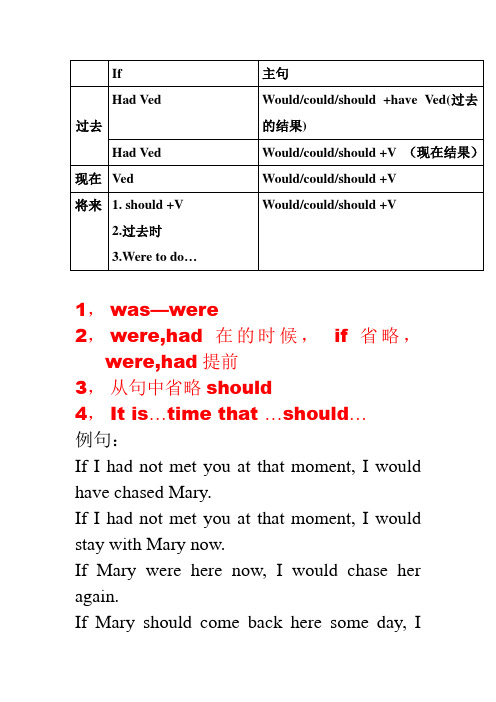
1,was—were2,were,had在的时候,if省略,were,had提前3,从句中省略should4,It is…time that …should…例句:If I had not met you at that moment, I would have chased Mary.If I had not met you at that moment, I would stay with Mary now.If Mary were here now, I would chase her again.If Mary should come back here some day, Iwould chase her once more.需要使用虚拟语气的词,短语以及句型:一、句型:It is demanded…It is necessary …It is a pity…It is…time that …shouldWhether…or…二、词:Suggest/Insist+…(should)…三、短语1. as if, as though, seem as if,2.would rather, would (had) rather, would as soon, would sooner和would prefer+that…(should)…3.Supposing that, supposed that, given that…4.if it were not for…与现在事实相反,if it had not been for与过去事实相反but for that…but for+短语5.in case, so that ,unless, lest ,for fear thatWould have done 本来会Should have done 本来应该Could have done 本来可以/可能…May have done 本来可以…Might have done 本来可以…Must have done 一定已经…Needn’t have done 本来不需要…I would have had a trip to America last year, but my mother was ill, so I gave it up.If you were to smoke here, you would be punished.If you didn’t answer my question now, you would not get through the test.If you should open the door, you would find it is dangerous in it.Whether you like it or not, you should take it.。
- 1、下载文档前请自行甄别文档内容的完整性,平台不提供额外的编辑、内容补充、找答案等附加服务。
- 2、"仅部分预览"的文档,不可在线预览部分如存在完整性等问题,可反馈申请退款(可完整预览的文档不适用该条件!)。
- 3、如文档侵犯您的权益,请联系客服反馈,我们会尽快为您处理(人工客服工作时间:9:00-18:30)。
虚拟语气的几个常见句型
河北安新中学田姝晨
虚拟语气表示说话人所说的话不是事实,而是一种假设、愿望、怀疑或推测。
常见的用法有以下几种:
一. if 引导的虚拟语气
1. 表示与现在事实相反或假设的情况
If I were you,I would take his advice. 如果我是你,我就会接受他的建议。
If there were no air or water, there would be no living things on the earth.如果没有空气和水,地球上就不会有生命。
2. 表示与过去事实相反或假设的情况
If I had got there earlier, I could have met her.如果我早一点到那的话就能见到她了。
If he had followed my advice, he would not have made such a big mistake. 如果他听了我的话,他就不会犯这么大的错误了。
3. 表示与将来事实相反或假设的情况
If it rained tomorrow, our picnic would be put off.
If it should rain tomorrow our picnic would be put off.
If it were to rain tomorrow our picnic would be put off.
如果明天下雨,我们的野餐将要被推迟了。
注意:在if引导的虚拟条件句中,如果谓语动词是had, were 或should 时,可以将if 省略并把had, were或should提前。
如:
Should it rain tomorrow, our picnic would be put off.
Had he followed my advice he wouldn’t have made such a big mistake. Were I you I would take his advice.
二: It is (high) time that sb did sth/ should do sth. 是该某人做某事的时候了。
It is high time that the children went to bed.
It is high time that the children should go to bed.是该孩子们上床睡觉的时候了。
三: 主语would rather (that ) sb did sth. 宁愿某人做某事。
I would rather he came tomorrow. 我宁愿他明天再来。
I would rahter I hadn’t said that. 我宁愿自己没那么说过。
四: advise, suggest, recommend, require, demand, command,order, insist, propose 等动词的宾语从句中谓语动词常用should +动词原形;同时这些动词的名词形式advice, suggestion, recommendation, requirement, command, order, proposal的同位语从句或表语从句中的谓语动词也用should+动词原形的形式, 其中should可以省略。
She required that the boy be retested. 她要求孩子被再测一次。
He suggested all the passengers remain seated. 他建议所有的乘客留在座位上。
Her suggestion was that the boy should be retested.
His proposal that all passengers remain seated is reasonable.
此外,这些动词用于It be done that clause结构中是,从句中的谓语
动词也是should+动词原形。
It is required that all passengers should remain seated when the plane takes off.
五: It is important / necessary /strange / natural that sb should do sth.
It is necessary that we should take a break now. 现在,我们有必要休息一下了。
It is natural that we should take good care of our parents. 我们理所当然应该好好照顾我们的父母
It is important that we should learn English well. 学好英语很重要。
It is strange that she should do so. 她竟然这样做真是太奇怪了。
六: if only引起的虚拟语气
If only I had more free time. 要是我有更多的自由时间就好了。
If only I had bought that house. 要是我早点买了那所房子就好了。
